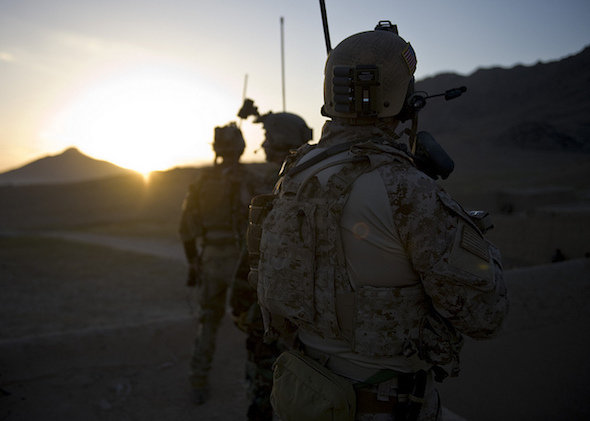Navy SEAL Command Accused of Covering Up a Beating Death
American soldiers say Navy SEALs and members of the Afghan Local Police physically abused detainees, an offense The New York Times calls “among the most serious” that “an American service member can commit." And instead of disciplining the offenders, the military promoted three of them.

U.S. troops in Kandahar province, Afghanistan. (ResoluteSupportMedia / CC BY 2.0)
American soldiers say Navy SEALs and members of the Afghan Local Police physically abused detainees, an offense The New York Times calls “among the most serious” that “an American service member can commit.” And instead of disciplining the offenders, the military promoted three of them.
The Times describes what the SEALs allegedly did:
The three Navy SEALs stomped on the bound Afghan detainees and dropped heavy stones on their chests, the witnesses recalled. They stood on the prisoners’ heads and poured bottles of water on some of their faces in what, to a pair of Army soldiers, appeared to be an improvised form of waterboarding.
A few hours earlier, shortly after dawn on May 31, 2012, a bomb had exploded at a checkpoint manned by an Afghan Local Police unit that the SEALs were training. Angered by the death of one of their comrades in the blast, the police militiamen had rounded up half a dozen or more suspects from a market in the village of Kalach and forced them to a nearby American outpost. Along the way, they beat them with rifle butts and car antennas.
A United States Army medic standing guard at the base, Specialist David Walker, had expected the men from SEAL Team 2 to put a stop to the abuse. Instead, he said, one of them “jump-kicked this guy kneeling on the ground.” Two others joined in, Specialist Walker and several other soldiers recounted, and along with the Afghan militiamen, they beat the detainees so badly that by dusk, one would die.
The four American soldiers working with the SEALs reported the episode, which has not previously been disclosed. In a Navy criminal investigation, two Navy support personnel said they had witnessed some abuse by the SEALs, as did a local police officer. Separately, an Afghan detained with the man who died provided a detailed account of mistreatment by American troops and Afghan militiamen in an interview with The New York Times.
The SEAL command cleared Team 2 of wrongdoing, not via a customary court-martial, but via a closed disciplinary process typically used for minor infractions. Officials disregarded a Navy lawyer’s recommendation that the troops face charges of assault.
“It just comes down to what’s wrong and what’s right,” Walker said in a recent interview with the Times. “You can’t squint hard enough to make this gray.”
Even before the beatings, some of the SEALs had exhibited troubling behavior. According to the soldiers and Afghan villagers, they had amused themselves by tossing grenades over the walls of their base, firing high-caliber weapons at passing vehicles and even aiming slingshots at children, striking them in the face with hard candy.
Abuse of detainees is among the most serious offenses an American service member can commit. Several military justice experts, who reviewed a Naval Criminal Investigative Service report on the case at the request of The Times, said that it had been inappropriate for the SEAL command to treat such allegations as an internal disciplinary matter and that it should have referred the case for an Article 32 review, the equivalent of a grand jury, to consider a court-martial.
While the death of the detainee involved just one life in a conflict that has killed thousands, it “had broader consequences,” the Times continues.
Instead of winning over the local population, the goal of the mission, the reported abuse further alienated villagers. It drove some previously cooperative Afghans to leave for Taliban-controlled areas, residents said.
The SEALs’ failure to restrain the Afghan Local Police, who were supposed to protect villages but instead often terrorized them, helped erode confidence in the American and Afghan governments, whose forces have repeatedly been accused of abusing or killing civilians.
During the United States’ engagement in Afghanistan, now stretching into its 15th year, the American military has expanded the mandate for SEALs, sometimes assigning them roles for which they are neither suited nor trained.
Brushing away serious charges, military justice experts said, reflects a breakdown of accountability that feeds the perception that SEALs and other elite Special Operations units get undue leeway when it comes to discipline. In murky wars with unclear battle lines, they warned, that can corrode ethical clarity and undermine morale.
Continue reading here.
— Posted by Alexander Reed Kelly.
Your support matters…Independent journalism is under threat and overshadowed by heavily funded mainstream media.
You can help level the playing field. Become a member.
Your tax-deductible contribution keeps us digging beneath the headlines to give you thought-provoking, investigative reporting and analysis that unearths what's really happening- without compromise.
Give today to support our courageous, independent journalists.






You need to be a supporter to comment.
There are currently no responses to this article.
Be the first to respond.